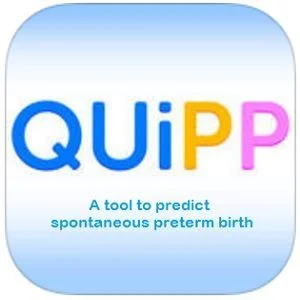A new app (QUiPP) developed at King's College London can help doctors identify women at risk of giving birth prematurely, according to results of two studies published in the journal Ultrasound in Obstetrics & Gynecology. The app uses an algorithm that combines the gestation of previous pregnancies and the length of the cervix with levels of a biomarker found in vaginal fluid — foetal fibronectin — to classify a woman's risk.
Each year, 15 million babies are born preterm (before 37 weeks) across the globe and over a million of these die of prematurity-related complications. A number of factors are used to determine if a woman is at risk of giving birth early, including a history of preterm births or late miscarriages, the length of cervix and levels of foetal fibronectin. The researchers have further developed the foetal fibronectin test to be accurately used from the first half of pregnancy.
QUiPP was tested in two studies of high-risk women being monitored at ante-natal clinics. The first study focused on women (n = 1,249) deemed to be a high risk of preterm birth, usually because of a previous early pregnancy, despite not showing any symptoms. The model was developed on the first 624 consecutive women and validated on the subsequent 625. The estimated probability of delivery before 30, 34 or 37 weeks' gestation and within two or four weeks of testing for foetal fibronectin was calculated for each patient and analysed as a predictive test for the actual occurrence of each event.
The second study included a group of women (n = 382) showing symptoms of early labour which often doesn't progress to real labour. The model was developed on the first 190 women and validated on the remaining 192. Probabilities of delivering early were estimated as above.
In both studies, the app was found to perform well as a predictive tool, and far better than each component (previous pregnancy, cervical length or foetal fibronectin) taken alone.
The app can be used by clinicians to improve the estimation of the probability of premature delivery (before 34 weeks' gestation or within two weeks of the foetal fibronectin test) and to potentially tailor clinical management decisions, according to the research team led by Professor Andrew Shennan, who is a professor of obstetrics at King's College London.
However, further work is needed to clinically evaluate the model in practice, and to ascertain whether interventions improve the pregnancy outcome for women identified as high risk by the app.
QUiPP is available to download for free from the Apple store.
Source: eHealthNews.eu
Image credit: Apple Store
Each year, 15 million babies are born preterm (before 37 weeks) across the globe and over a million of these die of prematurity-related complications. A number of factors are used to determine if a woman is at risk of giving birth early, including a history of preterm births or late miscarriages, the length of cervix and levels of foetal fibronectin. The researchers have further developed the foetal fibronectin test to be accurately used from the first half of pregnancy.
QUiPP was tested in two studies of high-risk women being monitored at ante-natal clinics. The first study focused on women (n = 1,249) deemed to be a high risk of preterm birth, usually because of a previous early pregnancy, despite not showing any symptoms. The model was developed on the first 624 consecutive women and validated on the subsequent 625. The estimated probability of delivery before 30, 34 or 37 weeks' gestation and within two or four weeks of testing for foetal fibronectin was calculated for each patient and analysed as a predictive test for the actual occurrence of each event.
The second study included a group of women (n = 382) showing symptoms of early labour which often doesn't progress to real labour. The model was developed on the first 190 women and validated on the remaining 192. Probabilities of delivering early were estimated as above.
In both studies, the app was found to perform well as a predictive tool, and far better than each component (previous pregnancy, cervical length or foetal fibronectin) taken alone.
The app can be used by clinicians to improve the estimation of the probability of premature delivery (before 34 weeks' gestation or within two weeks of the foetal fibronectin test) and to potentially tailor clinical management decisions, according to the research team led by Professor Andrew Shennan, who is a professor of obstetrics at King's College London.
However, further work is needed to clinically evaluate the model in practice, and to ascertain whether interventions improve the pregnancy outcome for women identified as high risk by the app.
QUiPP is available to download for free from the Apple store.
Source: eHealthNews.eu
Image credit: Apple Store
Latest Articles
healthmanagement, app, pregnancy, preterm birth, preterm labour, algorithm
A new app (QUiPP) developed at King's College London can help doctors identify women at risk of giving birth prematurely, according to results of two studies published in the journal Ultrasound in Obstetrics & Gynecology. The app uses an algorithm that co










